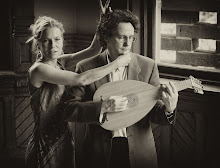Wednesday, November 21, 2012
On 7th of November we were up at York University for a co-lecture about Hamlet and the lyric.
Seth Lerer, Dean of Arts and Humanities at University of California at San Diego gave a talk for the first part of the event. To call him a ‘Renaissance Man’ would be an understatement given the wide range of his scholarship. Seek out his appearances on various podcasts. Check his Amazon books too.
We talked about some of Ophelia’s songs, her association with the lute in one contemporary stage direction (focused on here by Prof. Deanne Williams, the organizer of the event), some songs that she should have been singing if she had been a good girl and broadened out to some melancholy emblems that are associated with Hamlet and that occur in contemporary song lyrics.
Seth had talked about how so many songs and poems seem to be coming from the wrong mouths. The bookish Hamlet writes the worst doggerel lyric poem in a letter read out by Polonius. The rude mechanical grave digger sings a song with words taken from the posh anthology of courtly poetry Songes and Sonettes, known as Tottel’s Miscellany. And Ophelia sings, with her lute in hand some of the rudest ballad songs. But not only that, we found that the texts she sings that appear to be less rude are actually associated with other near-contemporary ballad texts that where an older, richer man seduces, or attempts to seduce, a younger woman.
Would the audience at the original performances have been saying ‘Oh, she’s singing that tune that has the other words of The princely wooing of the fair maid of London by King Edward’ (to the tune of Robin is to the Greenwood Gone) and ‘Oh, that’s the one that has the other words where the rich merchant is trying it on with Bess the farmer’s wife’ (to the tune of Walsingham)?
We then sang Coy Daphne fled/Chaste Daphne fled (a 2 for 1 song with different texts that praise and mock chastity) and Like as the Lute (a kind of patchwork quilt of musical definition demonstrations for the lute song student) from John Danyel’s songbook dedicated to Miss Anne Green as an example of what young lute-learning women should be singing. After that we looked at the mega-hit Lachrimae/Flow my tears from John Dowland’s Second Book of Songs, the melancholy poet of which has many parallel symptoms with Hamlet. Download us singing that here if you haven't already.
Subscribe to:
Post Comments (Atom)






No comments:
Post a Comment